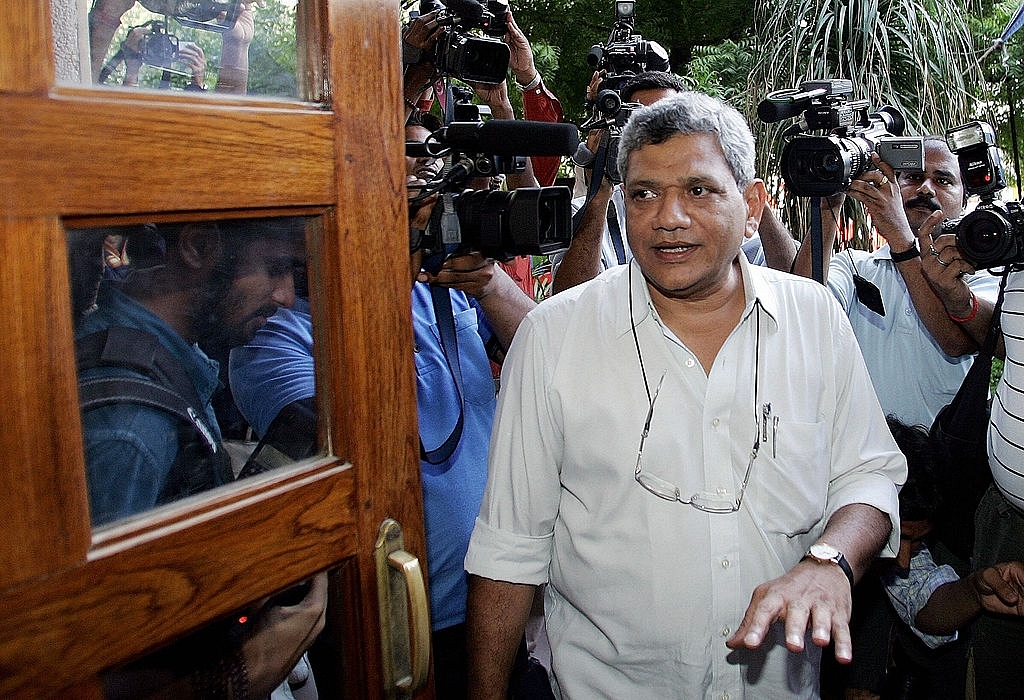Politics
When Sitaram Yechury’s Own Party Gave Him A Reality Check
- For Sitaram Yechury, staying politically relevant, even at the cost of ideology and personal convictions, is what seems to matter most. And this is exactly what needs to be called out.

Sitaram Yechuri. (PRAKASH SINGH/AFP/GettyImages)
Last Sunday saw the ignominious defeat of Communist Party of India-Marxist (CPI-M) general secretary Sitaram Yechury’s proposal to form an alliance with the Congress and other parties against the Bharatiya Janata Party (BJP). His predecessor Prakash Karat’s ‘no alliance, no understanding’ (with the Congress) proposal got the support of 55 members of the party’s central committee, which met in Kolkata for three days over last weekend.
The rejection of Yechury’s proposal should serve as a reality check for everyone, including the media. For a ‘leader’ of a party that has a miniscule nine members in the Lok Sabha and eight in the Rajya Sabha, Yechury gets disproportionate attention from, and space in, the media. That to a leader, who cannot get even a simple majority of the members of his party’s central committee to support his crucial (crucial for the party, that is) proposal.
The last time a CPI-M general secretary (Puchalapalli Sundarayya) faced a rejection of his proposals and ideas by the central committee, he resigned (in 1975). Yechury, too, claimed he offered to quit but the politburo urged him to continue as his quitting would expose the rift within the party, which had broken away from its parent party, CPI, to toe a pro-China line in 1964. But Karat and some other CPI-M leaders dispute that.
Be that as it may, if Yechury had been firm in his conviction and honest to his ideas, he would definitely have stepped down and insisted on the party accepting his resignation. That he chose to make a show of his purported resignation is perhaps reflective on how much he believes in his own convictions. Not really surprising, though, for someone who preferred not to test his own popularity by contesting even a municipal poll and chose, instead, the Rajya Sabha route to Parliament.
Many news channels and newspapers devoted a lot of airtime and reams of newsprint to the CPI-M’s central committee meeting in Kolkata and its outcome which, to be honest, will have little impact on Indian politics. And they continue quoting Yechury or taking his soundbites on everything under the sun. Yechury is the most visible face of a party that has no presence across most of India, has been reduced to a pale shadow of its former self in West Bengal, is facing a major challenge in Tripura, and clings on to power in Kerala through terror tactics.
The question that the media needs to ask itself is why should the ‘leader’ of such a party get so much attention. Apart from the BJP and the Congress, there are six other parties that have higher numerical strength in the Lok Sabha. But have we seen leaders of the All India Anna Dravida Munnetra Kazhagam (37 MPs), the Biju Janata Dal (20 MPs), the Shiv Sena (18 MPs), the Telugu Desam Party (16 MPs) or the Telangana Rashtra Samithi (11 MPs) get as much media attention as Yechury? For that matter, even the YSR Congress Party, by virtue of the fact that it has the same number of MPs in the Lok Sabha as the CPI-M, should also get similar attention and media space as Yechury and his party.
Returning to the main issue of Yechury’s proposal to align with the Congress, it is nothing but a desperate bid to keep himself and his party relevant in the country’s changed political landscape. Yechury feels that without tying itself to the fraying apron-strings of the Congress, the CPI-M will lose whatever political relevance it still enjoys. An alliance with the Congress may not yield electoral gains for the Marxists – it will be no surprise if the CPI-M’s tally of Lok Sabha seats declines next year – but will definitely keep it on a form of artificial ventilation.
Even if it fades away into oblivion in West Bengal, loses power in Tripura, and its Lok Sabha strength gets reduced to single digit, the CPI-M will have some traction as a constituent of a Congress-led alliance of parties. That the CPI-M was born out of opposition to the undivided CPI’s subservience to its masters in Moscow who wanted the CPI to play ball with the Congress, is a matter that holds no importance for Yechury. For him, staying politically relevant, even at the cost of ideology and personal convictions, is what seems to matter most. And this is exactly what needs to be called out.
Support Swarajya's 50 Ground Reports Project & Sponsor A Story
Every general election Swarajya does a 50 ground reports project.
Aimed only at serious readers and those who appreciate the nuances of political undercurrents, the project provides a sense of India's electoral landscape. As you know, these reports are produced after considerable investment of travel, time and effort on the ground.
This time too we've kicked off the project in style and have covered over 30 constituencies already. If you're someone who appreciates such work and have enjoyed our coverage please consider sponsoring a ground report for just Rs 2999 to Rs 19,999 - it goes a long way in helping us produce more quality reportage.
You can also back this project by becoming a subscriber for as little as Rs 999 - so do click on this links and choose a plan that suits you and back us.
Click below to contribute.
Latest